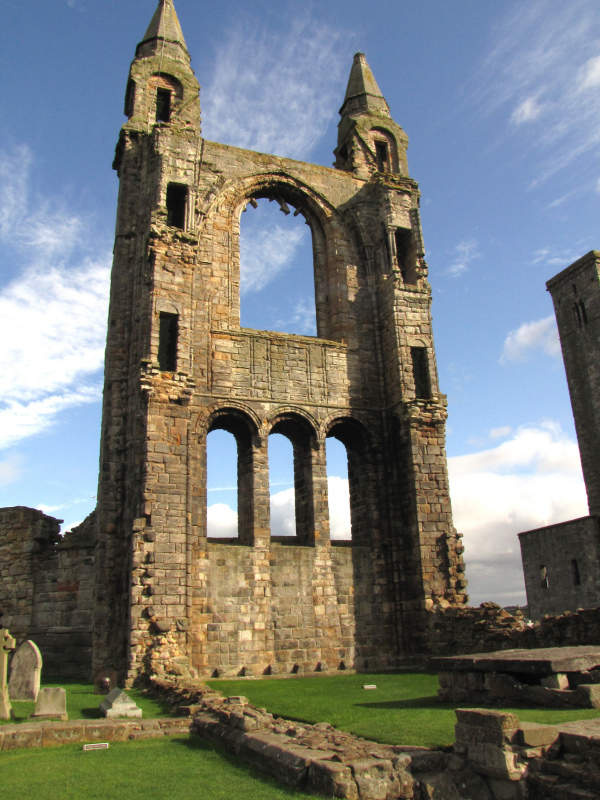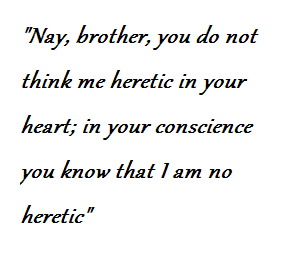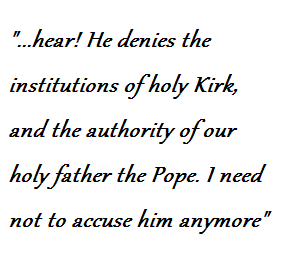The Trial

Within a month of his encounter with Archbishop Beaton and the council of theologians, Hamilton was arrested and imprisoned. A date was set for a formal hearing on the last day of February.
On the morning of the 29th Hamilton was led under guard to the cathedral to face his accusers.
He was placed in the pulpit, where he could be seen by all who had assembled, and the council of theologians handed over their judgment on the articles on which Hamilton had previously been interrogated.
The same Friar Campbell who had agreed with Hamilton in private then came forward to publicly accuse him of heresy.
Alexander Alane was present at the cathedral. He later wrote that: “I… heard him answering for his life to the charges of heresy which were laid against him. These were read aloud by a Dominican friar; and he [Hamilton] was so far from disowning the doctrines which were alleged against him as heresies, that he defended and established them by clear testimonies of Scripture, and refuted the reasonings of his accuser.”
Robert Lindsay of Pitscottie provides an account of the exchanges between Campbell and Hamilton:
Campbell: ‘Heretic!’
Hamilton: ‘Nay, brother, you do not think me heretic in your heart; in your conscience you know that I am no heretic.’
Campbell: ‘Heretic! Heretic! thou saidst it was lawful to all men to read the Word of God, and specially the New Testament.’
Hamilton: ‘I wot not, if I said so;  but I say now, it is reason and lawful to all men that have souls to read the Word of God, and that they are able to understand the same, and in particular, the latter will and testament of Christ Jesus, whereby they may acknowledge their sins and repent of the same, and amend their lives by faith and repentance, and come to the mercy of God by Christ Jesus.’
but I say now, it is reason and lawful to all men that have souls to read the Word of God, and that they are able to understand the same, and in particular, the latter will and testament of Christ Jesus, whereby they may acknowledge their sins and repent of the same, and amend their lives by faith and repentance, and come to the mercy of God by Christ Jesus.’
Campbell: ‘Now, heretic, I see that thou affirmest the words of thy accusation.’
Hamilton: ‘I affirm nothing but the word which I have spoken in the presence of this auditory.’
Campbell: ‘Now, farther, thou sayest it is not lawful to worship imagery.’
Hamilton: ‘I say no more, than what God spake to Moses in the twentieth chapter of Exodus, in the second commandment, ”Thou shalt not make any graven image; thou shalt not bow down to them nor worship them.” And also David, in his Psalms, eurseth them that are the makers of images, and the maintainers and worshippers of the same.’
Campbell: ‘Heretic, knowest thou not that imagery is the books of the lay and common people, to put them in remembrance of the holy saints that wrought for their salvation?’
Hamilton: ‘Brother, it ought to be preaching of the true Word of God that should put the people in remembrance of the blood of Christ and their salvation.’
Campbell: ‘Heretic! thou sayest it is but lost labour to pray to or call upon saints, and in particular on the blessed Virgin Mary, or John, James, Peter, or Paul, as mediators to God for us.’
Hamilton: ‘I say with Paul, “There is no mediator betwixt God and man, but Christ Jesus his Son” and whatsoever they be who call or pray to any saint departed, they spoil Christ Jesus of his office.’
Campbell: ‘Heretic! thou sayest  it is all in vain our labours made for them that are departed, when we sing soul-masses, psalms, and dirigies, which are the relaxation of the souls that are departed, who are continued in the pains of purgatory.’
it is all in vain our labours made for them that are departed, when we sing soul-masses, psalms, and dirigies, which are the relaxation of the souls that are departed, who are continued in the pains of purgatory.’
Hamilton: ‘Brother! I have never read in the Scripture of God of such a place as purgatory; nor yet believe I that there is anything that may purge the souls of men but the blood of Christ Jesus, which ransom standeth in no earthly thing, nor in soul-mass nor dirigie, nor in gold nor Silver, but only by repentance of sins, and faith in the blood of Christ Jesus.’
These last accusations did not concern the written articles which Hamilton had previously addressed, and which had been condemned by the council of theologians. They nevertheless challenged the central tenets of the Roman church. Hamilton had renounced prayers to the saints, spoken against prayers to the blessed Virgin, condemned the use of images, and denied the existence of purgatory. Campbell did not need to pursue the matter further.
Campbell: ‘My Lord Archbishop, you hear! He denies the institutions of holy Kirk, and the authority of our holy father the Pope. I need not to accuse him anymore’.